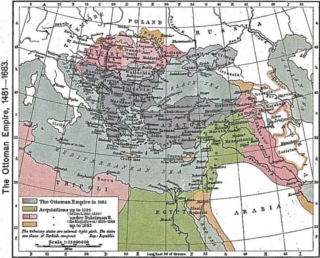-

-
Courses
Find courses by:
Collections
Cross-Disciplinary Topic Lists
- About
- Donate
- Featured Sites

Map showing the expansion of the Ottoman Empire from 1481 to 1683. (From Shepherd, William R. The Historical Atlas. New York, NY: Henry Holt & Co., 1923.)
Prof. Margery Resnick
Prof. Patricia Tang
21F.076
Fall 2009
Undergraduate
This subject examines the paradoxes of contemporary globalization. Through lectures, discussions and student presentations, we will study the cultural, linguistic, social and political impact of globalization across broad international borders and on specific language communities. We will consider answers to key questions such as: What are the contending definitions of globalization? What are the principal agents of change? How have those agents of change been transformed in our contemporary world? What's new, what's hybrid, and what's traditional? What does it mean to be a world citizen? How can world citizens preserve cultural specificity?
Resnick, Margery, and Patricia Tang. 21F.076 Globalization: the Good, the Bad, and the In-Between, Fall 2009. (MIT OpenCourseWare: Massachusetts Institute of Technology), http://ocw.mit.edu/courses/foreign-languages-and-literatures/21f-076-globalization-the-good-the-bad-and-the-in-between-fall-2009 (Accessed). License: Creative Commons BY-NC-SA
For more information about using these materials and the Creative Commons license, see our Terms of Use.
